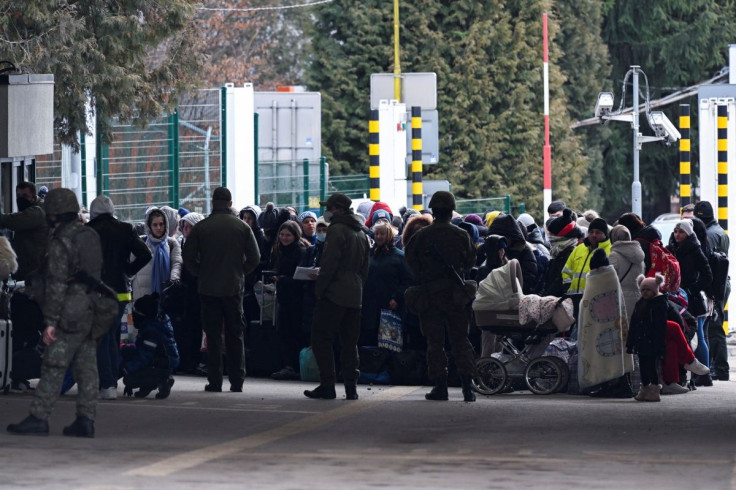Refugees Flee Ukraine Across EU Borders As Russia Renews Assault

Refugees fleeing Russia's invasion of Ukraine poured across its western borders on the third day of fighting on Saturday, with more than 100,000 reaching Poland so far, many making the final stretch of their journeys to safety on foot.
As Russian forces pounded Ukrainian cities including the capital Kyiv with artillery and cruise missiles, fearful families thronged European Union borders hoping to enter Poland, Slovakia, Romania and Hungary.
Ukrainians already safely in the European Union waited anxiously at the borders for relatives to join them.
"The most important thing is that people survive," said Katharina Asselborn, wiping away tears as she waited at the Polish border for her sister, aunt and her three children from their home in Odessa.
"I don't know what will happen next. They lost their own house. It's so terrible. The last 30 kilometres to the border they went on foot."
At the Hungarian border town of Beregsurany, 69-year-old Ilona Varga crossed into the European Union on foot, leaving behind her home, shop and hopes she might soon return.
"My kids are telling me to move over to Hungary for good, and they are right," Varga said. "But it is so hard to leave everything behind, I was born here, I grew up here, I have my work here, everything ties me here."
At the same border post, 58-year-old Nataliya Ableyeva brought a stranger's two children to safety after border guards prevented their fighting-age Ukrainian father from crossing.
"Their father simply handed over the two kids to me, and trusted me, giving me their passports to bring them over," she said. On the Hungarian side, the two children were reunited with their mother.
At Medyka in the south of Poland, some 85 km (50 miles) from Lviv in western Ukraine, thousands of Ukrainians waited for officials to process them as refugees. A group of women dragging suitcases with small children sitting on them shouted "Glory to Ukraine" as they passed.
The lines grew during the day at the crossing point. Refugees sifted through bags of clothes, blankets and toys and other supplies left by the side of the road. Locals left donations of food for anyone who needed it and set up tables with hot coffee while children handed out sweets.
"I arrived today at 3 a.m. and I am waiting for my wife," Taras, 25, told Reuters on the Polish side. "She called me from the Ukrainian side and there is a 30 kilometre queue of cars and people. She said she does not know when she will cross."
MOTHERS AND CHILDREN
Russian President Vladimir Putin launched what he called a special military operation before dawn on Thursday.
The Polish government has reserved 70,000 hospital beds for the war wounded and prepared a train to transport the injured from Ukraine. More train wagons been loaded with humanitarian supplies for the Lviv region.
"If necessary, the train will go to Mostyka (just across the border) to pick up the injured and then travel to Warsaw where the injured...will be transported to specialist hospitals," Polish Interior Minister Andrzej Adamczyk said.
Czech railways sent special trains that arrived early on Saturday at the Polish border carrying Ukrainians living in the Czech Republic to meet family members who had escaped the war.
In the Slovak border town Ubla, officials put refugees in a local gymnasium where foldout beds and air mattresses filled a basketball court. The government also announced it would give financial aid to anyone sheltering refugees.
The country's interior ministry said over the past 24 hours, authorities processed 10,526 people at the Slovak-Ukraine border. Before the conflict, they averaged 1,444 people daily.
A local official said the crisis on the borders was worsening, with more people arriving on foot, without money or food.
"Families are divided at Ukrainian side - men are returned back for fighting. Mothers with children are coming here," Kosice region chief Rastislav Trnka said.
In Romania, the Orthodox Church housed refugees at a 15th century monastery.
Arriving in the Romanian town of Sighetu Marmatiei, Natalia Zheltukahina spoke in disbelief about the conflict she had fled.
"It's surreal ... It's nothing connected to the real life that we used to have and it's devastating," she said.
"I'm calling my mom and she tells me that it's quiet right now but they were shooting like half an hour ago ... And what's happening in Kyiv, that's - I mean, I love Kyiv so much and I just can't watch the news."
© Copyright Thomson Reuters 2024. All rights reserved.







